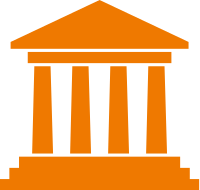What is Federalism?
Federalism means that the national and state governments share power.
The 10th Amendment of the Constitution helps to define federalism:
"The powers not delegated to the United States by the Constitution, nor prohibited by it to the States, are reserved to the States respectively, or to the people."
A Brief History of Federalism in the United States
When the United States was first formed, the states wanted all the power. They essentially wanted to be independent nations. When the Articles of Confederation were created, a national government was formed. However, the national government had very few powers, which did not allow the new country to grow or pay debts. As a result, the Constitutional Convention was called and the Constitution was created.
 For more detailed information on the adoption of the Constitution, see AP Government & Politics 1A
For more detailed information on the adoption of the Constitution, see AP Government & Politics 1A
Link to
National Powers vs. State Powers
National Government Powers:
- Makes currency
- Declare wars
- Create military branches
- Sign treaties with foreign nations
- Regulate interstate and international commerce
- Make post offices and stamps
- Make laws to support the Constitution
State Government Powers:
- Create local governments
- Issue licenses for marriage, driving, hunting, etc...
- Regulate commerce within the state
- Hold elections
- Ratify amendments
- Support the public health of the citizens
- Set laws for legal drinking and smoking ages
- Creating state Constitutions
- Any power not specifically given to the national government
Shared Powers:
- Creating courts
- Starting and collecting taxes
- Making highways
- Borrowing money
- Creating banks
- Spending money to better the people
- Condemning private property with reason
Click here for the lesson plan "Balancing Federal and State Authority" from PBS
Click here for a debate lesson plan on federalism from iCivics.
Click here for a lesson plan connecting federalism to current events.
Click here for the game "Power Play" from iCivics.
Sources:
1. PBS. "Federalism: Constitution USA" http://www.pbs.org/tpt/constitution-usa-peter-sagal/federalism/#.UhVaBz_Bxik
2. USGovAbout. "National vs. State Government" http://usgovinfo.about.com/od/rightsandfreedoms/a/federalism.htm
Comments (0)
You don't have permission to comment on this page.